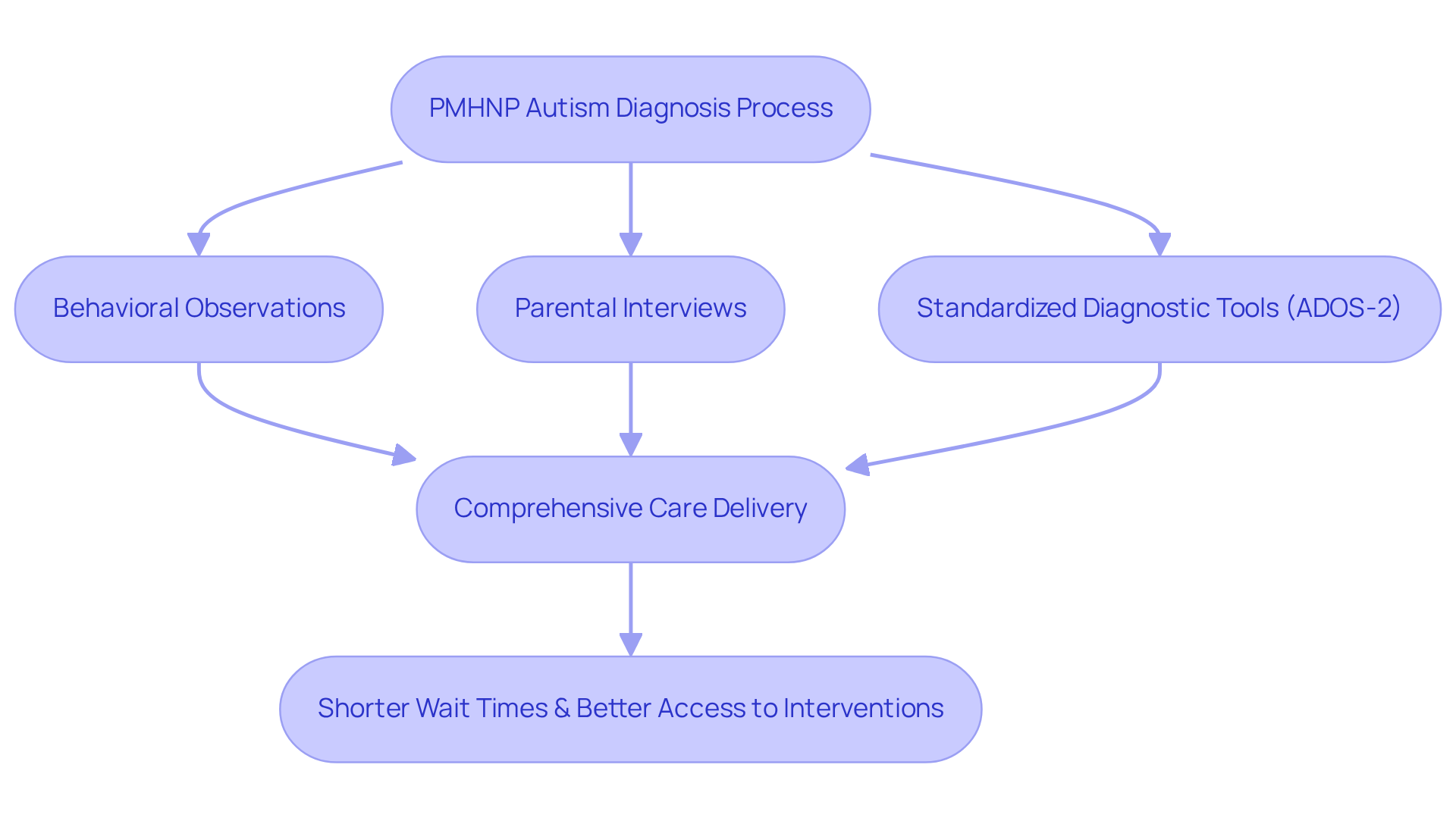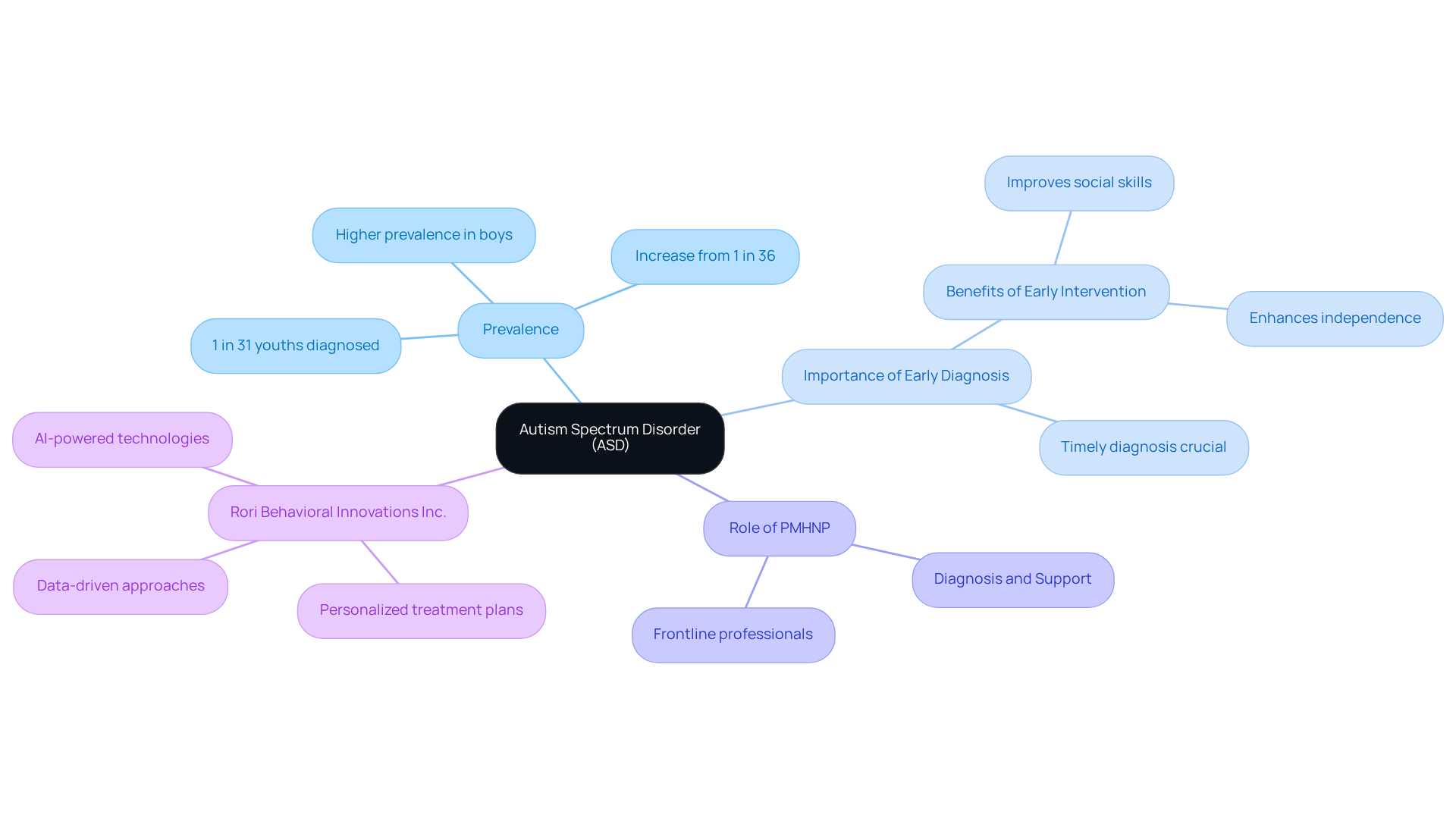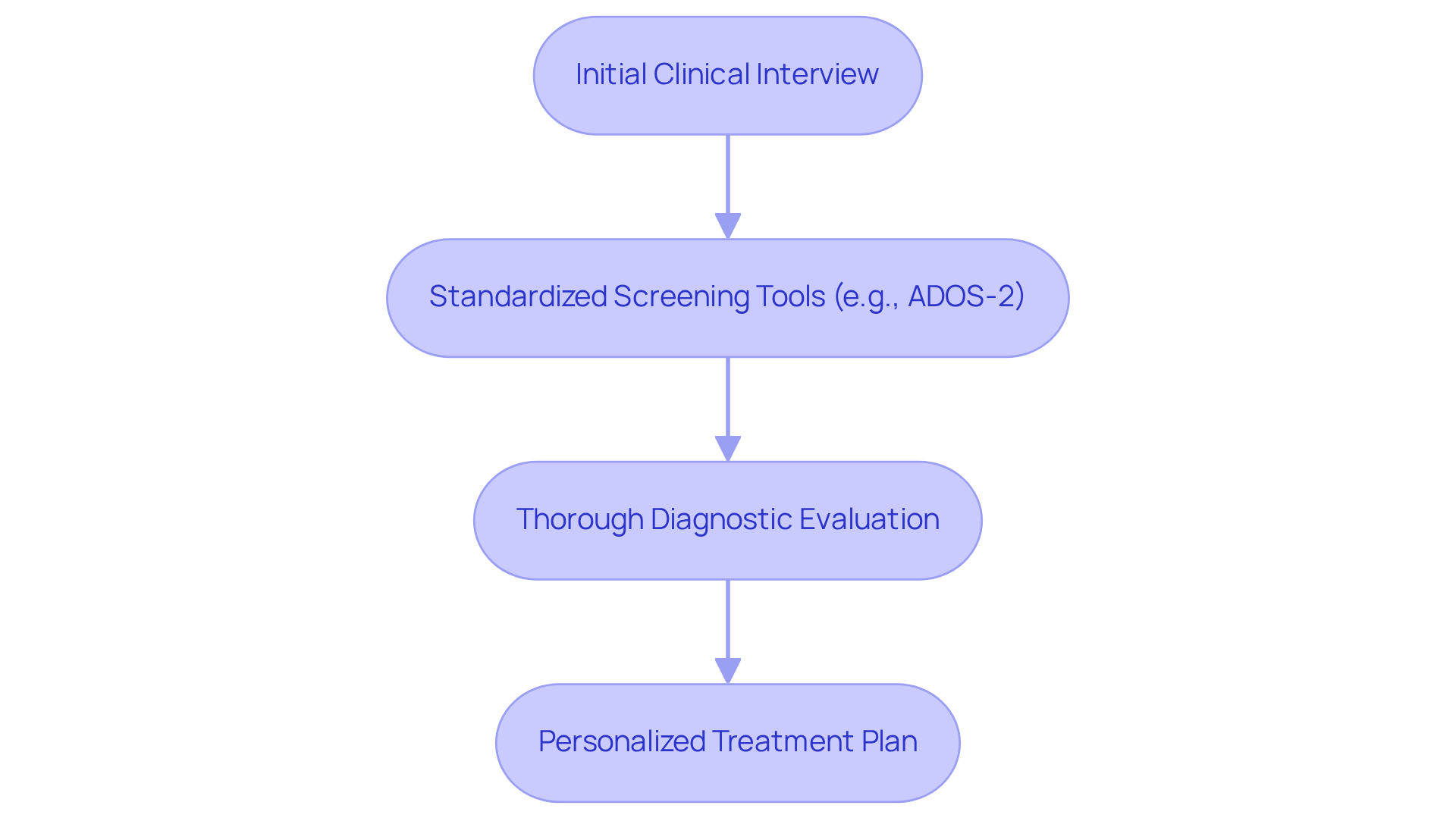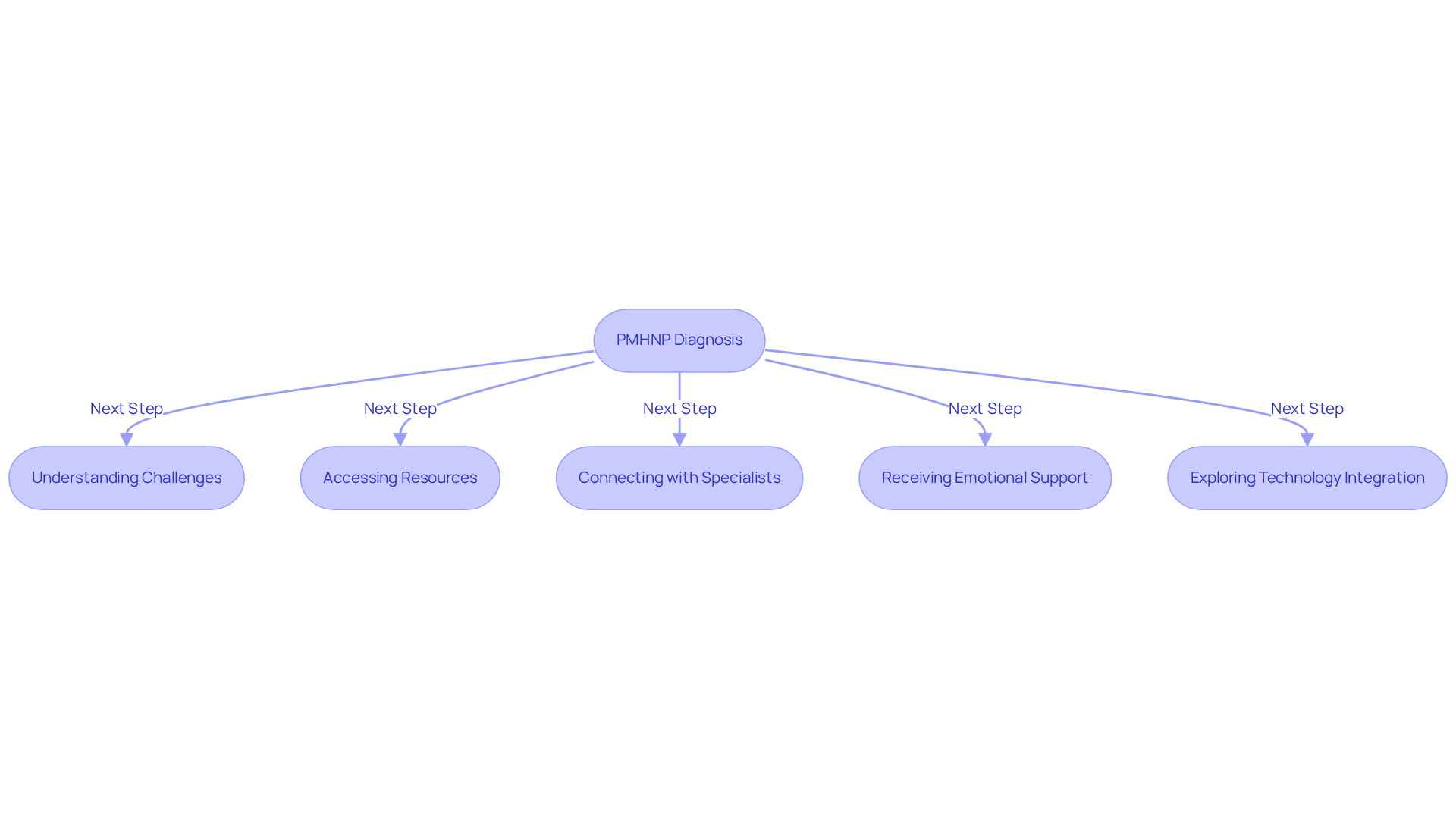Psychiatric Mental Health Nurse Practitioners (PMHNPs) play a vital role in diagnosing autism spectrum disorder (ASD). They use a comprehensive approach that includes:
This thorough method ensures that parents feel supported and understood.
It's so important for PMHNPs to provide timely diagnoses and tailored interventions. By doing so, they help individuals with developmental disorders receive the necessary support for optimal growth and development. Let’s explore this together and see how we can make a difference in the lives of those affected!
The rising prevalence of Autism Spectrum Disorder (ASD) is a reality that many families are facing today, with about 1 in 31 youths in the U.S. affected. This highlights an urgent need for timely diagnosis and intervention. Enter Psychiatric Mental Health Nurse Practitioners (PMHNPs), who are stepping into a pivotal role in this landscape. They come equipped with specialized training to evaluate and diagnose autism effectively.
But how can PMHNPs navigate the complexities of autism diagnosis? And what does this mean for families seeking support? 🤔 This article delves into the essential functions of PMHNPs in diagnosing autism, exploring their methodologies and the profound implications for families embarking on this journey. Let’s explore this together!
A Psychiatric Mental Health Nurse Practitioner (PMHNP) can diagnose autism spectrum disorder (ASD) and plays a vital role in evaluating it. These practitioners, with specialized training in mental health and developmental disorders, can PMHNP diagnose autism by combining their clinical knowledge with evidence-based methods to identify developmental conditions in both children and adults. 🤗
Their thorough assessments often include:
This multifaceted approach enables PMHNPs to deliver that addresses both the medical and emotional needs of individuals with developmental disorders, and it raises the question of how can PMHNPs diagnose autism for their families.
Recent updates in PMHNP training have made a significant difference! They've enhanced their effectiveness in diagnosing developmental disorders, highlighting the importance of understanding if a PMHNP can diagnose autism, leading to shorter wait times for assessments and better access to timely interventions. By utilizing their unique expertise, PMHNPs ensure that individuals with developmental disorders receive the support they need as soon as possible—something that is crucial for positive growth outcomes.
Let’s explore this together! If you have any questions or need support, remember, we’re here to help you every step of the way! 🌟

Autism Spectrum Disorder (ASD) is that brings about ongoing challenges in social communication and includes restricted, repetitive behaviors. Did you know that recent statistics from the CDC show that about 1 in 31 youths in the U.S. are diagnosed with autism? This is a significant increase from previous years! This rise in diagnoses really underscores the importance of early identification and intervention. Getting help early can make a big difference in a child's development and overall quality of life.
Timely diagnosis is crucial, especially since studies reveal that kids diagnosed by age two can really benefit from interventions that boost their social skills and independence. At , we’re dedicated to offering personalized treatment plans and thorough evaluations led by a team of highly qualified professionals who specialize in neurodevelopmental disorders. Our approach incorporates ABA principles, equipping caregivers with specific strategies and data collection techniques to support their children’s behavioral goals.
In this journey, an important question is whether can PMHNP diagnose autism, as mental health nurse practitioners often play a key role. They are the frontline professionals who can PMHNP diagnose autism and help identify ASD, making them essential in the healthcare landscape. Their expertise ensures that children receive the support and resources they need to thrive. Let’s explore this together! We’re here to help you every step of the way!

The journey to understanding autism can feel overwhelming for parents, but knowing that PMHNPs can diagnose autism helps ensure you have guidance through it! 🌟 It all starts with a friendly, in-depth clinical interview with your child and their caregivers. This is where the PMHNP gathers important developmental history and observes behaviors—think of it as a conversation that helps paint a complete picture.
Next up, standardized screening tools like the Autism Diagnostic Observation Schedule (ADOS-2) come into play. These tools help evaluate your child's communication skills, social interactions, and behavioral patterns. If the screening suggests a developmental disorder, don’t worry! A thorough diagnostic evaluation follows, which may include additional assessments and consultations with other healthcare professionals. This multi-faceted approach not only aims for an accurate diagnosis but also takes into account your child's unique context.
Ultimately, this leads to just for them! By incorporating standardized instruments and collective assessments, PMHNPs show their dedication to providing efficient and tailored support for young individuals with developmental disorders, which raises the question of whether PMHNPs can diagnose autism. Remember, you’re not alone in this journey—we’re here to help you every step of the way! 💖

A significant moment for families can occur when they find out that a PMHNP can diagnose autism. It often brings a blend of relief and anxiety as they start to understand their loved one's challenges. After the diagnosis, families typically receive a wealth of resources and tailored suggestions that cater to their child's needs. This could include access to behavioral therapies, educational support, and community services aimed at nurturing development.
At Rori Care, our clinical leadership team is dedicated to connecting families with additional specialists, like speech and occupational therapists, to create a comprehensive care plan. This collaborative approach ensures all aspects of the individual's growth are considered. Plus, the emotional support provided by PMHNPs is invaluable; they help families navigate the complexities of developmental disorders, empowering them to advocate effectively for their child's needs. This support fosters a nurturing environment that is vital for the young one's growth and independence.
As we look ahead to 2025, the array of resources available to families after a diagnosis continues to grow, focusing on accessibility and inclusivity. Families can tap into various programs and services tailored to their unique situations, ensuring they never feel alone on this journey. The integration of technology in caring for individuals with developmental disorders also enhances support systems, allowing for personalized interventions that can lead to improved outcomes. Notably, studies show that 90% of children with active caregiver involvement make significant progress through , underscoring its effectiveness in addressing developmental disorders.
Ultimately, the role of PMHNPs goes beyond just providing a diagnosis, as they can PMHNP diagnose autism and are essential in building a supportive framework that empowers families and promotes the well-being of youth. Ready to take the first step toward a brighter future for your child? Let's explore this together! Sign up for a free consultation with our compassionate experts at Rori Care.

The role of a Psychiatric Mental Health Nurse Practitioner (PMHNP) in diagnosing autism spectrum disorder (ASD) is incredibly important. These professionals have specialized training that allows them to effectively identify developmental conditions. By using a comprehensive approach that combines clinical assessments, behavioral observations, and standardized diagnostic tools, PMHNPs can provide timely and accurate diagnoses. This is essential for accessing the right interventions.
In this article, we highlighted key insights, such as:
PMHNPs not only diagnose autism but also guide families through the complexities of developmental disorders, ensuring that children receive the necessary support to thrive.
Reflecting on the increasing prevalence of autism, it’s clear that accessible and efficient diagnostic processes are needed. Families are encouraged to seek the expertise of PMHNPs, who can facilitate early intervention and provide a wealth of resources tailored to individual needs. By fostering a collaborative environment, PMHNPs empower families to advocate for their children, ultimately leading to improved outcomes and a brighter future.
Taking that first step towards understanding and addressing autism can make a significant difference. Support is available, and families should not hesitate to reach out for guidance. Let’s explore this journey together! We’re here to help you every step of the way!
What is the role of a Psychiatric Mental Health Nurse Practitioner (PMHNP) in autism diagnosis?
A PMHNP can diagnose autism spectrum disorder (ASD) and plays a vital role in evaluating it by using their specialized training in mental health and developmental disorders.
What methods do PMHNPs use to diagnose autism?
PMHNPs use a combination of clinical knowledge and evidence-based methods, including behavioral observations, parental interviews, and standardized diagnostic tools like the Autism Diagnostic Observation Schedule, Second Edition (ADOS-2).
Why is the ADOS-2 important in diagnosing autism?
The ADOS-2 is recognized as the gold standard for diagnosing autism spectrum disorder, making it a crucial tool in the assessment process.
How do PMHNPs ensure comprehensive care for individuals with developmental disorders?
PMHNPs deliver comprehensive care by addressing both the medical and emotional needs of individuals with developmental disorders through their thorough assessments.
What recent updates in PMHNP training have impacted autism diagnosis?
Recent updates in PMHNP training have enhanced their effectiveness in diagnosing developmental disorders, leading to shorter wait times for assessments and better access to timely interventions.
Why is timely intervention important for individuals with developmental disorders?
Timely intervention is crucial for positive growth outcomes, ensuring that individuals with developmental disorders receive the support they need as soon as possible.